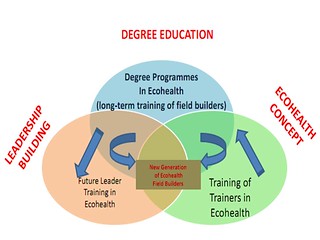TRUNG TÂM NGHIÊN CỨU Y TẾ CÔNG CỘNG VÀ HỆ SINH THÁI
CENTER FOR PUBLIC HEALTH AND ECOSYSTEM RESEARCH
CENPHER

The Field Building Leadership Initiatives (FBLI): Advancing Ecohealth in South East Asia is the 5 - year (2011-2016) project funded by the International Development Research Center (IDRC), Canada and implemented by eight different partner institutions within the SEA region namely the Health Systems Research Institute, Nonthaburi, Thailand (http://www.hsri.or.th/en ), the Kunming Institute of Botany, Yunnan, China (http://english.kib.cas.cn ), the Kunming Medical University , Yunnan, China (http://www.kmmc.cn/kmmc/default.aspx ), the Mahidol University, Bangkok, Thailand (http://mahidol.ac.th ), the University of Indonesia, Jakarta, Indonesia (http://www.ui.ac.id/en ), the Veterinarians Without Borders, Victoria, Canada (https://www.vetswithoutborders.ca ), and the Hanoi School of Public Health, Vietnam.
Over the past three decades, Southeast Asia (SEA) and neighboring countries have suffered from the side effects of globalization. Economic growth, agricultural intensification and urbanization have had profound implications for ecosystems and health. Innovative change is needed to develop agricultural and livestock systems that deliver increased production while preserving or enhancing ecosystem services. The prevention and control of infectious diseases requires regional cooperation. The Field Building Leadership Initiatives (FBLI): Advancing Ecohealth in South East Asia is the 5 - year (2011-2016) project funded by the International Development Research Center (IDRC), Canada and implemented by eight different partner institutions within the SEA region namely the Health Systems Research Institute, Nonthaburi, Thailand (http://www.hsri.or.th/en ), the Kunming Institute of Botany, Yunnan, China (http://english.kib.cas.cn ), the Kunming Medical University , Yunnan, China (http://www.kmmc.cn/kmmc/default.aspx ), the Mahidol University, Bangkok, Thailand (http://mahidol.ac.th ), the University of Indonesia, Jakarta, Indonesia (http://www.ui.ac.id/en ), the Veterinarians Without Borders, Victoria, Canada (https://www.vetswithoutborders.ca ), and the Hanoi School of Public Health, Vietnam (http://www.huph.edu.vn ). The project aims at :
The FBLI program will feature four interlinked components that correspond to our program objectives. The research component will serve as the backbone of the initiative, providing sites and substance for the capacity building, knowledge translation and networking components – which in turn will feed back into and strengthen the research work.

The Capacity Building component of the FBLI
FBLI components and activities will be firmly rooted in the ecohealth approach, guided by six key principles: systems thinking, transdisciplinary research, participation, sustainability, gender and social equity, and knowledge-to-action emphasis. ( Charron, 2012 in Ecohealth Research in Practice, IDRC ). As a result of the five-year FBLI, we wish to contribute to these outcomes:
For more details, please visit the website http://cenpher.huph.edu.vn/research/fbli